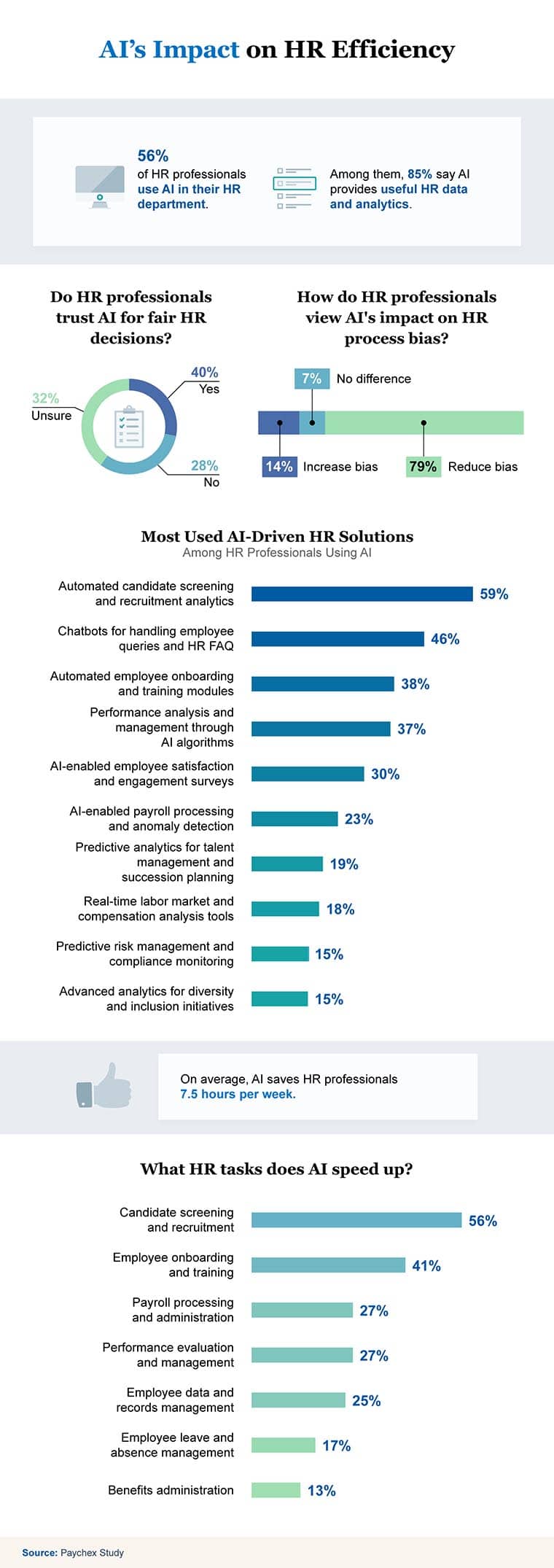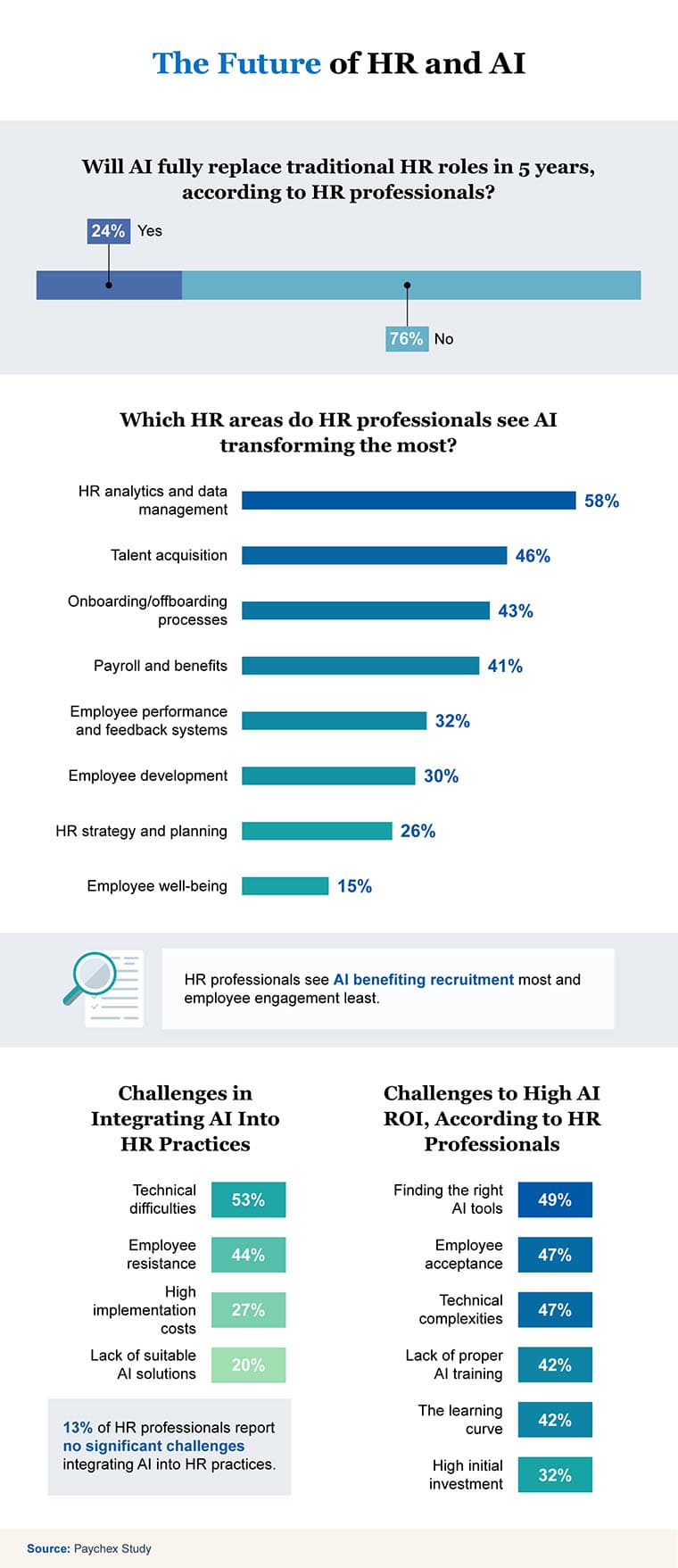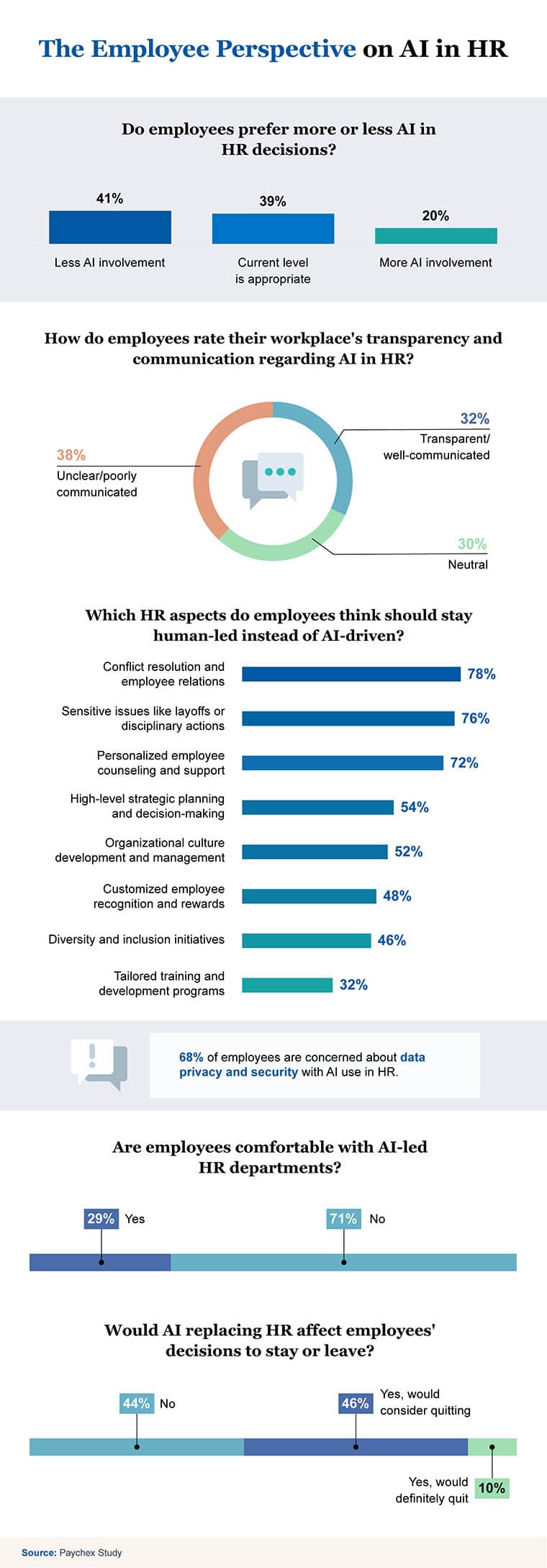- Our Research
- Article
- 6 min. Read
- Last Updated: 02/23/2024
Balancing Tech and Touch in Human Resources

Table of Contents
Technology, automation and analytics are seeping into every aspect of human resources, from hiring to conflict resolution. They promise efficiency, while also raising critical questions about privacy, trust, and the role of human judgment in a digitized workplace.
Our latest study unpacks how surveyed HR professionals and employees view technology’s burgeoning role, its effectiveness, and the challenges it poses. We looked to uncover the current sentiments surrounding AI in HR, the tasks it is reshaping, and the teetering balance between humans and machines in managing people. There are actionable steps HR professionals can take to utilize technology to improve their processes and the overall employee experience.
Key Survey Takeaways
- 41% of employees prefer less AI involvement in HR decisions, despite 56% of HR pros already using AI in their practice.
- Top aspects employees feel should stay human led: conflict resolution – 78% and disciplinary actions – 76%
- 85% of HR leaders say AI provides useful HR data and analytics.
- 79% of HR leaders feel AI helps reduce bias. Meanwhile, 14% think it increases bias, and 7% feel it makes no difference.
How Technology Is Transforming HR
From recruitment to benefits administration, we learn HR professionals’ perspectives on how technology enhances efficiency across various HR functions.

Adopting AI is a common focus among many business leaders in 2024. 56% of the HR professionals surveyed already use AI in their operations and 85% find it effective for HR analytics. However, there is a divided stance on trust. 40% trust AI to make fair HR decisions, 28% distrust it, and 32% are neutral.
27% say HR AI improves efficiency in their HR department, saving these professionals an average of 7.5 hours a week. 56% of respondents say technology speeds up employee recruitment and screening, while 41% say it speeds up employee training. Indicating that utilizing technology in tasks related to screening and hiring new job candidates is useful, which is crucial to business success in a tight labor market.
While 79% of HR leaders surveyed feel AI helps reduce bias, 14% think it increases bias, and 7% feel it makes no difference. These sentiments suggest that AI in HR could pave the way for fairer and more balanced business practices.
Opportunities and Challenges
Next, we’ll explore the anticipation and the challenges HR professionals face in maximizing technology’s return on investment (ROI).

In today’s tight labor market, businesses are increasingly turning to technology to streamline talent acquisition and onboarding processes. The ability to quickly identify and recruit the best candidates is particularly helpful for businesses competing to secure top talent.
Likewise, nearly a quarter of HR professionals surveyed anticipate AI will become integral to HR functions in the next five years, with a keen eye toward its transformative touch on analytics and data management (58%), talent acquisition (46%), and employee onboarding and offboarding (43%).
HR professionals say recruitment stands to gain the most, pointing to a future where hiring is more tech driven. However, they predict employee engagement is least likely to benefit from technology advancements. HR professionals can address this by strategizing and investing more time and resources in employee relations and development programs.
Over half of HR professionals (53%) surveyed report technical challenges with adopting AI. Nearly as many (44%) report resistance from staff. They also cite finding the right AI tools (49%), employee acceptance (47%), and technical complexities (47%) as the biggest challenges in achieving a high ROI from integrating AI in HR.
Transparency and Acceptance
How do employees outside of the HR department feel about AI? Their perspectives help HR professionals examine the need for human intuition and involvement in certain tasks.

As HR departments incorporate AI into their operations, only 11% of employees surveyed say the process is very transparent. Most are either neutral (30%) or somewhat unclear (25%) about its transparency. HR professionals can enhance this communication by clearly explaining AI’s role, its benefits, and how it impacts employees’ day-to-day work.
The balance of human and technology input is also a point of debate, with 41% of survey participants preferring less AI involvement in HR-related decision-making and nearly as many (39%) feeling its current level of involvement should remain the same.
There’s strong agreement among surveyed employees that conflict resolution and addressing sensitive professional matters should stay under human direction. This highlights a preference for a human touch in these interpersonal areas.
Similarly, data privacy showed up as a significant concern, with 68% wary of the data risks AI poses to HR processes. HR professionals can ensure employee data safety by implementing robust security protocols, regularly auditing AI systems for compliance, and transparently communicating these measures to build trust and reassure employees.
Considering the potential challenges of an AI-driven HR department, most employees are generally uncomfortable with the prospect (71%). Replacing HR with AI will lead almost half (46%) of employees to consider leaving their roles, and a considerable 1 in 10 say they would definitely quit.
Actionable Steps for HR Professionals:
- Support in implementing policies to safeguard AI practices – Ensure appropriate measures are taken to ensure data is safe.
- Ensure tools have been validated – This will help ensure compliance with new laws addressing the use of AI in HR, particular candidate selection, in addition to reduce the potential introduction of bias into HR practices.
- Read up on AI – Better understand how your tools may change. Begin working with legal counsel and trusted vendors to conduct AI audits on your data.
- Discover HR analytics tools – Learn about the different tools available to you to better support consultation with clients and your organization.
- Don’t lose sight of the human aspect of HR – Ensure there is a human element involved in all decisions with AI.
A Balancing Act
HR professionals are cautiously optimistic that artificial intelligence in HR can work. The time saved, biases potentially reduced, and the significant reshaping of recruitment and onboarding all point to an AI-driven future. Yet, the journey isn’t without its challenges — technical complexities and the quest for transparency remain.
Looking forward, balancing these tech-fueled efficiency improvements with a human touch will be crucial. HR Professionals must ensure AI augments rather than replaces the human element that’s so vital to the spirit of human resources.
Work With Paychex
Even as technology evolves, having a person in your corner who knows your business and can act as an extension of your team is essential. With Paychex, you can access proactive and dedicated support who deliver actionable HR advice to support your goals. Learn more today about working with a Paychex HR professional.
Methodology
Paychex surveyed 325 HR professionals and 1,017 employees on their perspective of AI usage in HR departments. Of HR professionals, company size was under 100 employees for 26%, between 100 and 499 employees for 24%, and 500 or more employees for the remaining 50%. The survey of HR professionals collected data from January 8th to the 16th, 2024, and the employee survey collected data on January 11th.
About Paychex
Paychex is a leading provider of integrated human capital management software solutions for human resources, employee benefits, insurance services, and payroll. Discover how we can support your business at Paychex.com.
Fair Use Statement
Feel free to share the insights from this page for noncommercial purposes, but please remember to credit the source and link back to this page for the full context. For questions or media inquiries please contact skjean@paychex.com.
Tags







